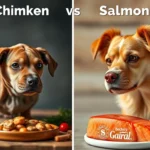
Introduction
Proper nutrition is paramount for maintaining the health and performance of hunting dogs. Unlike regular pet dogs, hunting dogs require a specialized diet that supports their rigorous activities, from tracking game to enduring long hours in the field. These dogs are typically more active and have unique dietary needs based on their breed, size, and the type of hunting they undertake.
In this article, we’ll explore the best dog foods for hunting dogs, focusing on their nutritional requirements, key ingredients to look for, different types of dog food suitable for them, and specific brand recommendations.
Understanding the Nutritional Needs of Hunting Dogs
Energy Requirements
Hunting dogs have significantly higher caloric needs compared to sedentary pets. Factors such as breed, size, and activity level influence these energy requirements. For instance, a Labrador Retriever actively hunting waterfowl will require more calories than a small breed like a Beagle.
A general rule of thumb is that active hunting dogs may need between 30% to 50% more calories than non-working dogs. It’s essential to monitor their weight and adjust their food intake accordingly to ensure they maintain optimal energy levels without becoming overweight.
Macronutrients
Proteins
Proteins are crucial for muscle repair and growth, especially for hunting dogs that engage in strenuous activities. A diet rich in high-quality protein sources helps support their overall health and performance. Look for dog foods where real meat is the first ingredient, such as chicken, beef, or fish.
Recommended protein sources include:
– Chicken
– Turkey
– Beef
– Fish
– Lamb
Fats
Fats play a vital role in providing energy, particularly for high-energy hunting dogs. Healthy fats, including omega-3 and omega-6 fatty acids, not only supply concentrated energy but also support coat health and cognitive function.
Beneficial fat sources include:
– Fish oil
– Flaxseed oil
– Chicken fat
Carbohydrates
While proteins and fats are essential, carbohydrates also play a role in providing quick energy. Complex carbohydrates, such as sweet potatoes, brown rice, and oats, are ideal as they offer sustained energy release without causing spikes in blood sugar.
Key Ingredients to Look for in Hunting Dog Food
High-Quality Protein Sources
When selecting food for your hunting dog, prioritize foods that list real meat as the first ingredient. Animal-based proteins provide the necessary amino acids for muscle maintenance and overall health. Avoid foods that rely heavily on plant-based protein sources, as they may not offer the complete nutrition your active dog needs.
Essential Fatty Acids
Including essential fatty acids in your hunting dog’s diet is critical for maintaining a healthy coat and supporting joint health. These fats can help reduce inflammation and promote overall vitality.
Vitamins and Minerals
Essential vitamins and minerals such as vitamins A, D, and E, as well as minerals like calcium and phosphorus, are vital for a hunting dog’s overall health. These nutrients support bone health, immune function, and energy metabolism.
Joint Support Ingredients
Active hunting dogs are prone to joint issues due to their demanding lifestyle. Ingredients like glucosamine and chondroitin are beneficial for joint support and can help maintain mobility in senior dogs or those that engage in strenuous activities.
Types of Dog Food Suitable for Hunting Dogs
Dry Kibble
Dry kibble is one of the most common types of dog food. It offers convenience, shelf stability, and can help keep teeth clean. However, not all kibble is created equal. Look for high-protein, grain-free options that cater specifically to the needs of hunting dogs.
Advantages:
– Long shelf life
– Easy to store and serve
– Helps reduce plaque and tartar buildup
Disadvantages:
– Some dogs may find kibble less palatable
– Requires access to fresh water
Wet Food
Wet food contains higher moisture content, which can be beneficial for hydration. Many hunting dogs find wet food more palatable, making it easier to entice picky eaters.
Recommended Brands:
– Blue Buffalo Homestyle Recipe
– Royal Canin Veterinary Diet
Raw Diets
The raw food movement has gained popularity among pet owners who believe in feeding their dogs a diet closer to what they would eat in the wild. While raw diets can offer some benefits, they also come with risks, such as bacterial contamination.
Benefits:
– High in natural nutrients
– Can improve coat condition
Risks:
– Potential for bacterial contamination
– Requires careful handling and preparation
Freeze-Dried and Dehydrated Foods
Freeze-dried and dehydrated foods provide a convenient option that retains most of the nutritional value of fresh ingredients. They are lightweight and easy to store, making them ideal for hunters who are on the move.
Benefits:
– Lightweight and easy to transport
– Retains most nutrients
Factors to Consider When Choosing Dog Food
Age and Life Stage
The nutritional needs of hunting dogs vary by age. Puppies require a diet rich in protein and calories to support growth, while adult dogs need a balanced diet to maintain energy levels. Senior hunting dogs may require food that supports joint health and has lower calories to prevent weight gain.
Specific Health Concerns
Some hunting dogs may have allergies or sensitivities. It’s essential to choose a dog food that caters to these specific needs. Grain-free or limited-ingredient diets can be beneficial for dogs with food allergies.
Activity Level
Adjusting your hunting dog’s diet based on their activity level is crucial. During hunting season, they may require more calories, while during downtime, a reduced caloric intake may be necessary to prevent weight gain.
Brand Reputation and Quality
Choosing reputable brands with stringent quality control measures is vital. Research the brand’s manufacturing practices and ingredient sourcing to ensure you’re providing the best nutrition for your hunting dog.
Recommended Brands and Formulations for Hunting Dogs
Top Kibble Brands
- Orijen Original Dry Dog Food: High in protein with fresh, regional ingredients.
- Taste of the Wild High Prairie Canine Recipe: Grain-free with roasted bison and roasted roasted lamb.
- Merrick Grain-Free Texas Beef & Sweet Potato Recipe: Features real beef as the first ingredient, rich in protein.
Best Wet Food Options
- Hill’s Science Diet Adult Wet Dog Food: Packed with nutrients tailored for active dogs.
- Wellness CORE Grain-Free Wet Dog Food: High in protein and made with natural ingredients.
Raw and Freeze-Dried Options
- Stella & Chewy’s Freeze-Dried Raw Dinner Morsels: Offers a balanced raw diet in convenient form.
- Primal Pet Foods Freeze-Dried Nuggets: Made from high-quality proteins with added vitamins.
Specialized Formulas
- Royal Canin Sporting Life Adult: Specifically formulated for active dogs with high energy needs.
- Purina Pro Plan Sport Performance 30/20: Designed for athletes with high protein and fat levels.
Feeding Guidelines and Tips
Portion Control
Calculating the right amount of food for your hunting dog is essential. Generally, the feeding guidelines on the dog food packaging provide a good starting point. Adjust portions based on your dog’s weight, activity level, and overall health.
Feeding Schedule
Establishing a consistent feeding schedule helps maintain your dog’s energy levels. For active dogs, feeding them twice a day can help keep their energy consistent throughout the day.
Transitioning Foods
When switching dog foods, it’s essential to do so gradually to avoid digestive issues. Start by mixing the new food with the current food over a week, gradually increasing the new food’s proportion.
Common Myths About Dog Nutrition
Grain-Free vs. Grain-Inclusive Diets
There is a common belief that grain-free diets are inherently better for dogs. However, many dogs can digest grains just fine, and they can offer beneficial nutrients. Always consider your individual dog’s needs.
Raw Diets as the Only Healthy Option
While raw diets can be beneficial, they are not the only healthy option. Many high-quality kibble and canned food can provide complete nutrition suitable for hunting dogs.
Supplements as Necessities
Not all dogs require supplements. A balanced diet tailored to your dog’s activity level and health needs may provide all the necessary nutrients without the need for additional supplementation.
Conclusion
In summary, choosing the best dog foods for hunting dogs involves understanding their unique nutritional requirements, selecting high-quality ingredients, and considering their specific activity levels and health concerns. Always consult with a veterinarian to tailor a nutrition plan that best fits your dog’s needs and lifestyle. By prioritizing their diet, you can ensure that your hunting dog remains healthy, energetic, and ready for action when it’s time to hit the field.
FAQs
What is the best dog food for hunting dogs?
The best dog food for hunting dogs is one that is high in protein, contains quality fats, and includes essential vitamins and minerals tailored to their activity level.
How often should I feed my hunting dog?
It’s generally recommended to feed active hunting dogs twice a day to maintain energy levels.
Can I feed my hunting dog a raw diet?
Yes, many hunting dogs thrive on a raw diet, but it’s essential to handle and prepare raw food safely to avoid contamination.
What supplements should I consider for my hunting dog?
Supplements may not be necessary if your dog is on a balanced diet. However, joint support supplements like glucosamine can be beneficial for active or senior dogs.
Are there specific diets for hunting dogs based on their breed?
Yes, different breeds may have varying nutritional needs based on their size and activity level. It’s important to choose food that meets these specific requirements.









